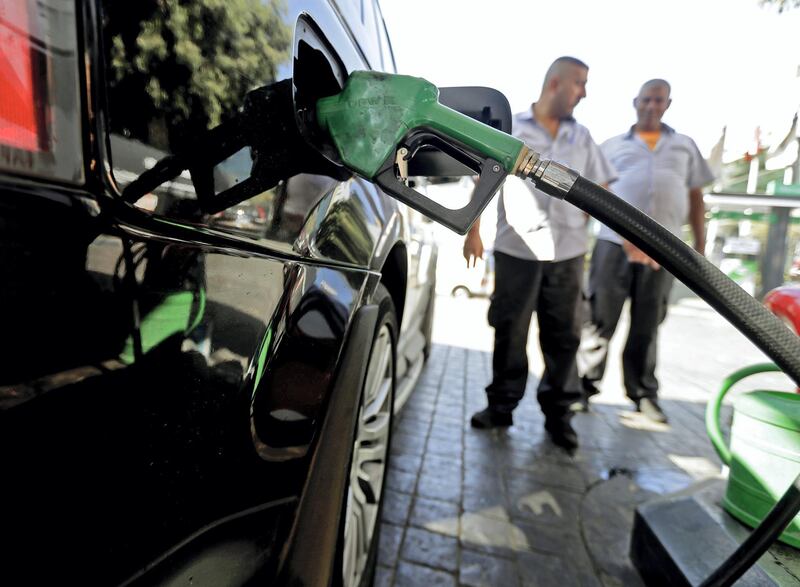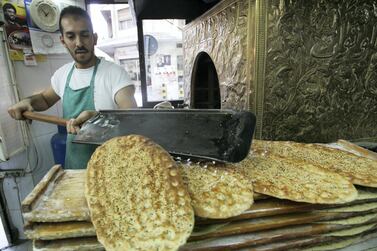Lebanon's fuel importers warned of higher costs for consumers under a new arrangement with the government to address a looming supply crisis created by a shortage of dollars.
The currency shortage threatened to leave motorists stranded when petrol stations launched a strike on Friday over importers' demand to be paid in dollars, not Lebanese pounds.
But the strike was called off by evening after importers and the government came to agreement on payment for imports.
"The new mode of import is different and there will be a cost," George Fayad, who represents Lebanon's eight fuel importers, told The National.
“We do not want to make an estimation yet. We will check costs and inform the Energy Ministry, who will add those costs into the price structure.”
The price of fuel is fixed every week by the ministry and varies with oil prices.
Dollars have become scarce in Lebanon over the past few months, severely affecting importers who buy from abroad in the US currency but sell locally in Lebanese pounds.
The country is highly dependent on imports, with a trade deficit last year of $17 billion (Dh62.4bn).
Because banks have restricted access to dollars, importers had to buy them on the black market at about 10 per cent above the official exchange rate, which has been fixed since 1997.
The dollar shortage also affected petrol station owners, who traditionally paid the importers in US currency but would have to buy them at the inflated black-market rates to continue doing so, prompting them to go on strike for a day on September 26.
A few days later, the central bank said it would guarantee access to dollars at the official exchange rate for fuel, medicine and wheat imports.
But new conditions were placed on importers of these goods, such as opening a letter of credit with a local bank, depositing the equivalent of the total dollar amount requested in Lebanese pounds, in addition to 15 per cent of the amount in dollars and paying a commission of 0.5 per cent.
Fuel importers told The National it was not clear at the time whether the central bank pledge would apply to fuel stocks already imported.
Tony Issa, vice president of Issa Petrol Trade, said the “security stock” of fuel set aside by importers was worth about $200 million and could supply the country for up to three weeks.
“They told us to start selling on Monday in Lebanese pounds. We did so for four or five days but could not find anyone to give us the dollars,” Mr Fayad said.
So on Friday, importers switched back to the old system of selling their fuel in dollars, triggering the strike by retailers.
The Lebanese pound and dollar are used together, but it would not have been legal for the fuel retailers to demand that their customers to pay only in the US currency, Mr Issa said.
After fuel retailers shut on Friday, the government promised the importers that the guarantee to convert payments received for fuel in Lebanese pounds into dollars would also apply to stocks already in the country.
“The government will pay us [the dollars] at a deferred date, between mid and end-November,” said Mr Fayad. “The problem is the dollar shortage, not the method. We have been importing and selling for years.”
Mr Issa said he did not expect more strikes in the fuel sector.
“An optimistic reading of the situation would be that this is a temporary measure that will stabilise markets,” he said. “We are worried that the country’s economic situation will worsen.”
On Thursday, the World Bank forecast that Lebanon’s economy would contract for the first time in 20 years.
The government has not given an explanation for the dollar shortage.
Some experts, including Banque du Liban Governor Riad Salameh, have blamed suspicious imports that are probably smuggled to war-torn Syria.
Others point to an accumulation of factors including the struggling economy and regional instability.
With a debt-to-GDP ratio of about 150 per cent, Lebanon is one of the world's most indebted countries.
The problems faced by fuel importers are replicated across Lebanon’s economy. Bakers have announced a strike on Monday because millers, who buy wheat from abroad, asked to be paid in dollars for their flour.
Fuel importers are not the only ones to warn of an imminent price rise. A Lebanese banker who works with several importers said he believed their costs were increasing by between 10 and 20 per cent, and that this would eventually mean higher prices.
Economist and former minister Charbel Nahas agreed with this estimate.
“With an increase in prices, we will see a rise in bankruptcies, unemployment, social problems and potentially security ones, too,” Mr Nahas said last week.
There have been protests against the banking sector in Beirut over the past three weeks but they have been small so far.






